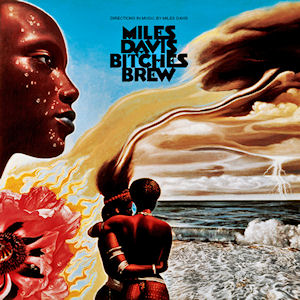
Bitches Brew
Bitches Brew is a studio album by American jazz trumpeter, composer, and bandleader Miles Davis. It was recorded from August 19 to 21, 1969, at Columbia's Studio B in New York City and released on March 30, 1970, by Columbia Records. It marked his continuing experimentation with electric instruments that he had featured on his previous record, the critically acclaimed In a Silent Way (1969). With these instruments, such as the electric piano and guitar, Davis departed from traditional jazz rhythms in favor of loose, rock-influenced arrangements based on improvisation. The final tracks were edited and pieced together by producer Teo Macero.
For the Shield episode, see Bitches Brew (The Shield). For the Aerosmith song, see Bitch's Brew.Bitches Brew
The album initially received a mixed critical and commercial response, but it gained momentum and became Davis' highest-charting album on the U.S. Billboard 200, peaking at No. 35. In 1971, it won a Grammy Award for Best Large Jazz Ensemble Album.[7] In 1976, it became Davis' first gold album to be certified by the Recording Industry Association of America.[8][9]
In subsequent years, Bitches Brew gained recognition as one of jazz's greatest albums and a progenitor of the jazz rock genre, as well as a major influence on rock and '70s crossover musicians.[3] In 1998, Columbia released The Complete Bitches Brew Sessions,[10] a four-disc box set that includes the original album and previously unreleased material. In 2003, the album was certified platinum, reflecting shipments of one million copies.
Release[edit]
Bitches Brew was released in March 1970. It gained commercial momentum for the next four months and peaked at No. 35 on the U.S. Billboard 200 for the week of July 4, 1970. This remains Davis' 2nd best performance on the chart behind Kind of Blue which has peaked at #3 on Vinyl and #12 in 2020.[23] On September 22, 2003, the album was certified platinum by the RIAA for selling one million copies in the U.S.
In addition to the standard stereo version, the album was also mixed for quadraphonic sound. Columbia released a quad LP version, using the SQ matrix system, in 1971. Sony reissued the album in Japan in 2018 on the Super Audio CD format containing both the complete stereo and quadraphonic mixes.[24]
Sources